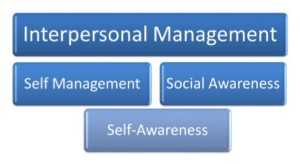
6 ways to build Emotional Intelligence
Some people seem to have been born emotionally intelligent. But what if you weren’t? Is Emotional Intelligence something that you can develop?
Yes, absolutely!
Indeed, there are people for whom EI (emotional intelligence) seems to come more easily. It certainly helps to be born into an emotionally intelligent family and to have good role models, but almost anyone can learn to behave with greater emotional intelligence.
In the first article of this three-part series, we talked about Emotional Intelligence: What is it? The second article addressed Why Emotional Intelligence is important for leaders. If you’ve not read these previous articles, you may find it helpful to do so first because, here, we are going to talk about how to develop your EI.
Previously, I presented a model to explain the four dimensions of Emotional Intelligence. That’s great for explaining the concept. But to understand how to develop Emotional Intelligence, we need to rearrange the blocks.
In the new configuration, self-awareness is clearly the base of emotional intelligence. Resting on top of self-awareness are self-management and social awareness. Interpersonal management is the last block to be set on the top of the model, the penultimate achievement of emotionally intelligent leaders.
 Self-awareness, is the foundation block of Emotional Intelligence. It is essential to understand our own emotions, moods, and triggers before we try to manage our emotions or recognize and understand the emotions of others.
Self-awareness, is the foundation block of Emotional Intelligence. It is essential to understand our own emotions, moods, and triggers before we try to manage our emotions or recognize and understand the emotions of others.
If a leader wants to develop his Emotional Intelligence, he should start with becoming a more self-aware leader.
Here are six ways to get started.
1. Decide. Commit to action, even if you don’t yet know what that action will be. Recognizing that you need to work on your emotional intelligence, is an awareness in itself.
2. Assess your emotional vocabulary. Write down every emotional word you can think of. Stick with words that describe how you might feel (happy, anxious, etc.) not what you might think (‘respected’, marginalized, etc.) These are not really emotions. They describe what you think is going on. If you come up with less than 20 words, research additional words and try to double your list.
3. Pick a single emotion to work on and notice and write down each time you feel that emotion. Work on the same emotion every day for a week. Fine tune your ability to notice it when it comes up.
4. Consider assessments to provide you with input / feedback or work with a coach who can help increase your self-awareness.
5. Observe yourself in particular situations and note the emotions that the situations bring out in you. For instance, with careful observation my client, Olivia, noticed that each time she was with a particular coworker she felt anxious and small. This was the first step in managing her relationship with that person.
6. Attend to your physical needs. We do everything better when we are well rested, hydrated, nourished and physically fit. Practicing emotional intelligence is no different. As you develop your self-awareness and move on to developing your skills in managing your emotions and empathizing with others, self-care will have an amazing impact on your performance. Don’t neglect it if you want to be successful.
As you continue to work on your emotional intelligence, there are many more exercises that you can do to build those muscles, and you will develop a great base on which to build.


